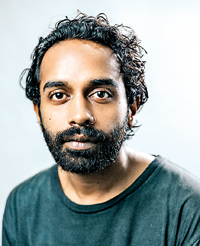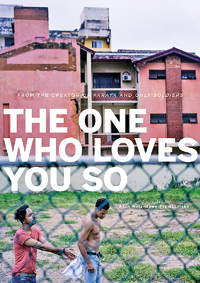LGBT community needs to tell their own stories as human beings

Arun Welandawe-Prematilleke
In our new fortnightly series, Yomal Senerath-Yapa talks to
the writers shortlisted for the Gratiaen Prize
2017 dawned with a sharp double-pronged epiphany for Arun Welandawe-Prematilleke. The new year was washed with the grief of a breakup with his ex-boyfriend. Three weeks in- the news also came of the Cabinet refusing a human rights action plan that wanted to repeal those articles of the Penal Code criminalizing homosexuality.
The two events tumbling in one after the other triggered a moment of revelation for Arun. “I realized that the idea of being a queer person- being part of the queer community-is in itself a political act.” It roused him out of a self-imposed hibernation, where he was supposed to recover from an exhausting fling with theatre–having been involved with 12 productions in one year. The scribbling pad was dug out and so began a journey inwards that was to result in The One Who Loves You So, the play that has made it to this year’s Gratiaen shortlist.
However, there were first, three intense months spent devouring piles of queer literature- James Baldwin, Tony Kushner, Jamie O’Neill, Larry Kramer- before he began to discern the outline of the story he wanted to tell.
It was a highly specific and highly personal story- based on his own experiences in Colombo- with a level of honesty and frankness that made him feel uncomfortable, even exposed, at first: the story of Vidura and Nick, two young men who meet each other via a gay dating app. Nick is a British expat who was originally a proletarian at home and Vidura, while being in his home ground, is at the other social end.
With different people reading the script, Arun lost that initial feeling of discomfort, gaining more confidence in its vision. After the successful run of the play, members of the queer community would react with genuine passion- to say that it was the first time they went to the theatre and saw themselves. It is important, says Arun, for the LGBTQIA community to tell their own stories as human beings- instead of being reduced to (often tragic) props and tools in straight narratives. To see their narratives, hushed and suppressed for so long, unfurl on stage with all those secret unspoken things being finally named and confronted- is simply liberation.
 At its heart, the play is about how difficult it can be to open yourself up to another person, to accept love from another person- and how the fact of being gay exacerbates this difficulty.
At its heart, the play is about how difficult it can be to open yourself up to another person, to accept love from another person- and how the fact of being gay exacerbates this difficulty.
Arun was pretty much Vidura, brought up in Colombo Seven with a family and a circle of friends who would have made coming to terms and coming out as padded and bolstered as possible. Even so that process was ‘incredibly difficult’ for him. A graduate of Goldsmiths College, the theatre lover has been a playwright, actor and director, and the Associate Artistic Director of Mind Adventures Theatre Company for five years.
The One Who Loves You So looks frankly at sex and does not try to make it palatable for straight audiences. Unapologetic and unabashed, it is also a story for any orientation- showing how sex is a fundamental part of love.
At the outset, it seems Vidura is the more sympathetic of the two- but as the play progresses individual identities get less defined and muddy. “We have certain ideas of who we are and how we compare ourselves to other people- which are informed by our politics and our ideas of the world” but when our orbits overlap with other people’s, those ideas get messed up- “in the most wonderful ways”. “We have to confront ourselves in order to let people in; we have to view ourselves with all our faults to allow other people in to give us affection,” Arun explains.
The play also explores the frailty and vulnerability of youth- more pronounced in queer characters because it is typical for them to have ‘arrested development’. Growing up, they are not afforded the same experiences straight people can have. Their first relationships and their first breakdowns happen much later, and so their emotional development in terms of relationships also get retarded.
A fact that gets underwritten in this age of championing alternative identities is that sexuality is really on a spectrum- a matter of volatile, subtle shades of grey rather than blacks and whites. Nick in the play is in fact a queer- in the sense of the word that he does not fit into binary ideas of gay or straight; or male or female (though Arun admits this idea is not given credence much in contemporary thought).
Class is another aspect that has squiggled itself into the play. Arun says, “Any writer who says that sex and gender and class don’t play into what they are writing about, is not being honest.” These coagulate naturally in whatever writing you produce. Nick and Vidura know exactly where they stand on the totem pole, and as the play progresses we see this irony: the person from the western world, who may seem the privileged counterpart actually struggles with his working class background while the third world character is immensely more privileged with his class and race.
It was also a shock that, when all the productions Arun churned out in the past six years had received generous funding, The One Who Loves You So was given the cold shoulder. It had to be budgeted entirely with crowdfunding.
“It may not have been because it was looking at queer issues, but perhaps because it was looking at sexuality and queer issues. Perhaps that deterred people,” Arun muses.
He is never one to jump on to that anti-homophobic high horse. He stresses he is no activist, but says it is not lost on him that he has been given this great platform. “I am aware that my privileges have afforded me the space to be able to say these things without having discrimination- without having opposition in any real and powerful way.”
“The hope is that, little by little, you can push the line a bit forward- so that other voices can do the same thing- and do it in far more interesting, newer, and more exciting, ways.”


